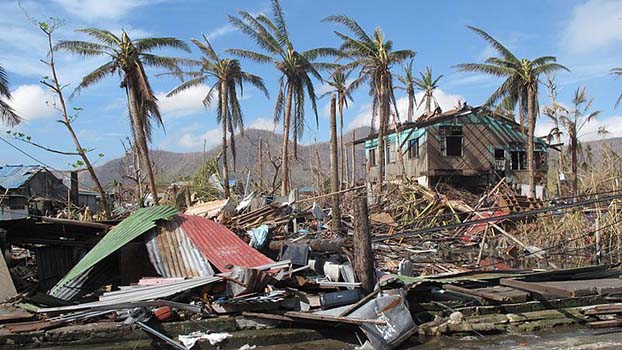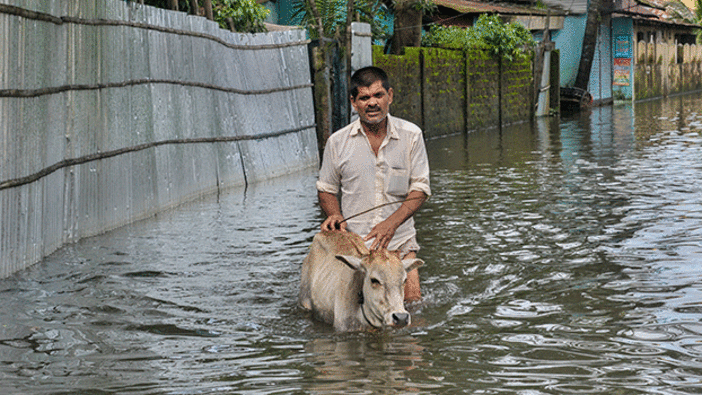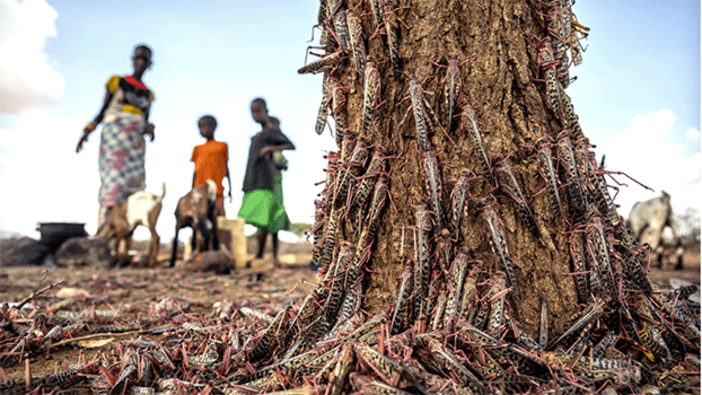
Although there was no COP26 this year, work associated with the UNFCCC negotiations has continued across a variety of topic areas. In October, the body that is officially mandated to work on loss and damage, the Executive Committee of the Warsaw International Mechanism (“ExCom”), conducted a virtual meeting. Hafij Khan, a climate change negotiator, spoke to us about the outcome of that meeting.
M. Hafijul Islam Khan (Hafij Khan) is director of the Centre for Climate Justice-Bangladesh (CCJ-B) as well as an environmental lawyer and climate change negotiator.
One of the main outcomes of the WIM ExCom meeting was that a number of new expert groups were launched: one on slow-onset events, one on non-economic losses, and one on action and support. Why are expert groups like this needed at all?
HK: Let’s have a look at the nature of slow-onset events and non-economic losses and damages. Why are they our concern? The effects of slow-onset events like increasing soil salinity, sea level rise, or desertification are connected with many uncertain adverse impacts. It is very difficult to assess the impacts and vulnerabilities associated with slow-onset events. So the task of the expert groups will be to develop tools and methodologies for risk assessment and to identify appropriate approaches to averting and minimizing loss and damage.
It is also crucial to identify and asses non-economic losses and damages. If, for example, people lose their land, they lose their home and territory. This is something very emotional, including important things like losing the graves where your mother or others are buried. If you migrate from the coastal zone to an urban area, you need to choose a new livelihood, you need to choose a new profession. So, there are many critical issues involved with addressing slow-onset processes and non-economic losses and damages.
What can we expect from these groups?
The expert groups try to identify the right approaches to avert, minimize, and address the losses and damages associated with slow-onset events or non-economic losses, and also the ways to implement those approaches with adequate resources available to support such approaches. Part of their task is also to develop monitoring systems to assess the progress and the effectiveness of those approaches on the ground.
Regarding the Expert Group on Action and Support—what kind of action and support are needed from the perspective of developing countries?
During the more than seven years of its existence, the Executive Committee of the Warsaw International Mechanism has focused on discussing issues and challenges related to loss and damage. What is important now is that we take action at the local, regional, and national levels. The COP mandates this expert group to explore the needs of financial and technical resources in vulnerable developing countries and to develop required mechanisms to support activities at local, national, and regional levels. This is exactly what vulnerable countries need right now: financial, technical, and capacity-building support in order to avert, minimize, and address loss and damage. And of course, they need the financial resources and mechanisms immediately to act now to address loss and damage associated with climate impacts at national levels.
What is the Warsaw International Mechanism Executive Committee?
The climate crisis leads to irreversible losses and damages. It hits especially the poorest countries of the Global South. After years of debate, the parties of the United Nations Framework Convention on Climate at the climate change conference in 2013 in Warsaw decided to establish the Warsaw International Mechanism. This institution is supposed to coordinate debates around issues of loss and damage: collect knowledge on how affected regions can avert and minimize the risks associated with loss and damage, coordinate activities, and organize financial and technical assistance as well as capacity building. The Executive Committee is the body of the Warsaw International Mechanism that guides the implementation of the functions of the Mechanism. It comprises 20 members, ten from developed countries and ten from developing countries, and meets at least twice per year in a setting open to observers.
More information on how the Warsaw International Mechanism works can be found here.
What do you think are the possible stumbling blocks, especially when it comes to quantifying or putting a price tag on non-economic losses? How do you assign a monetary value to culture, language, heritage, etc.?
This is a very difficult question. Coming back to the example of people losing their homes and livelihoods we spoke about earlier, I would like to point out that we primarily need to focus on what those people need, if they have to choose a new livelihood and a new profession, for example, training opportunities. This needs to be financed. However, there are many complex issues associated with non-economic losses and damages that you cannot address monetarily—we need to take pro-active measures to reduce and manage those.
Some developing countries and researchers say that compensation should be the main policy instrument when it comes to loss and damage…
Yes, indeed. But monetary compensation alone cannot help you, we also need technical assistance and capacity-building support. That is why it is so important to have these expert groups. We need the right kind of supports, the right kind of capacity building to support the people who suffer from non-economic losses. But of course, we need financial resources to be able do that.
Let’s talk about financing. The WIM has faced criticism on its failure to really pin down the issue of financing losses and damages from climate change. Civil society has been calling for a dedicated loss and damage fund, as opposed to the way that loss and damage financing has so far been put in the Green Climate Fund “basket”.
Talking about finance for loss and damage is a very critical aspect of policy discourse. Yes, civil society, NGOs, and also some researchers try to establish that there is a need for a dedicated loss and damage fund. In principle this is very logical. But if we look at the question of how long it took us to develop the Green Climate Fund, it was more than 20 years. So, if we think of a new fund for loss and damage, it will take more than 20 years again. Why should we have a new financial entity? Let’s open up a new separate window under the Green Climate Fund instead. We already had to fight hard to even establish an expert group on action and support for loss and damage. However, now further work remains to access the existing funds and to explore innovative sources of funds and financial mechanisms.
Would recognizing slow-onset events supply further evidence to hold rich countries and their transnational corporations accountable for long-term damages to the environment, and maybe strengthen the case for reparations for climate debt?
At first glance, yes, because a politics that focuses on climate debt is fundamentally about compensation. But viewed politically we need a paradigm shift from the compensation approach to collaborative policy approaches. That is to say, the developed countries need to support us and collaborate with us to develop tools and approaches and also to support us financially to be able to deal with the impacts of loss and damage at the local, national, and international level. We need to explore further the policy and judicial options to hold the polluters and transnational corporations liable for the losses and damages they have caused.
What are losses and damages?
Losses and damages may be caused by extreme events like tropical cyclones, heavy rainfalls and floods, heatwaves or droughts. Other losses and damages, the so-called “slow-onset events”, only become noticeable very gradually. They are caused, for example, by sea level rise, salinization of soil, ocean acidification, glacial retreat, loss of biodiversity, desertification, land and forest degradation and rising temperatures. On the one hand, losses can be economic losses when they affect people’s income (e.g. agriculture goes down) or destroy infrastructure. On the other, there are also non-economic losses: people may get ill, lose their land and cultural heritage, or need to migrate within their countries or across borders.
Apart from the expert groups, the Santiago Network was mentioned several times at the ExCom meeting. What is this group, what is its mandate? How will it help to advance the work on loss and damage?
At the moment I am very concerned with what the Santiago Network will be able to bring to the policy discourses on loss and damage. The idea of the Santiago Network was pushed at COP25 in Madrid by the Least Developed Countries (LDCs). We tried to make it clear that now is the time to act on the local, regional, and national level to address loss and damage. The Executive Committee of the Warsaw International Mechanism is not capable of supporting national and local governments to take action at the national level. That’s why we need to establish an institutional structure that can do so. The Santiago Network was established to avert, minimize, and address loss and damage and to catalyse the technical assistance of relevant organizations, bodies, networks, and experts in order to implement relevant approaches.
The challenge now is to form this network. Further COP decisions, however, are needed to mandate the Executive Committee to develop the modalities and structure of the network. But who is doing this? That is a fundamental question. We need to develop some ideas about what exactly the network’s modalities, structures, and function will be. So far, we are a bit concerned about how the UNFFCC secretariat is handling this idea. The process is not participatory enough.
The ExCom talked about the need to raise awareness on loss and damage. What do you think of the idea circulating within civil society that cumulative loss and damage should be adopted as an indicator of climate action under the Paris Agreement? Can we show reduced loss and damage as an indicator of progress on both mitigation and adaptation?
Mitigation and adaptation are the proactive approaches to averting and minimizing losses and damages. Averting means mitigation. Minimizing means adaptation. Thereafter, we need to address residual loss and damage. That’s the way the loss and damage policy stream needs to be structured. Whenever we talk about loss and damage we need to think about mitigation first, then about adaptation. But adaption has its limits. That is why we need to think about comprehensive risk management and ways to address residual risks. This is how mitigation, adaption, and comprehensive risk management can be useful for averting, minimizing, and addressing losses and damages. The Executive Committee could develop a comprehensive awareness program that can be implemented at international, regional, and national levels.

